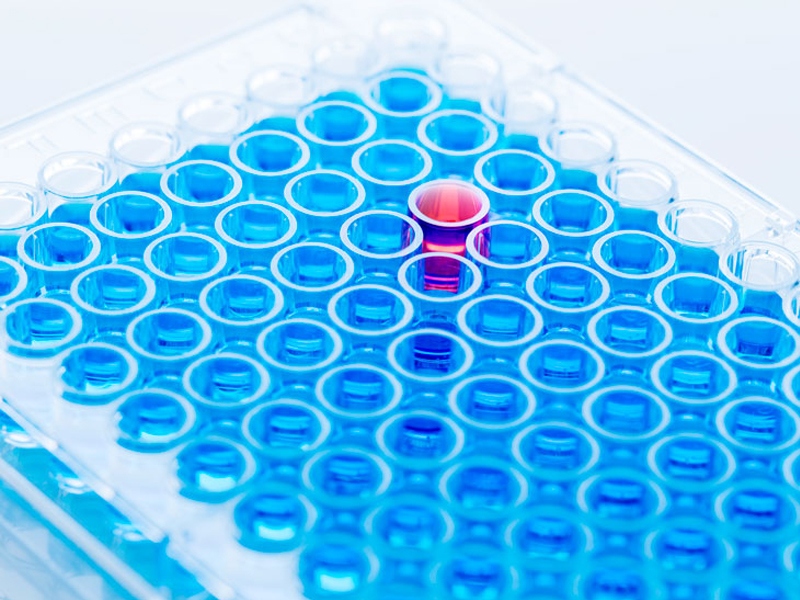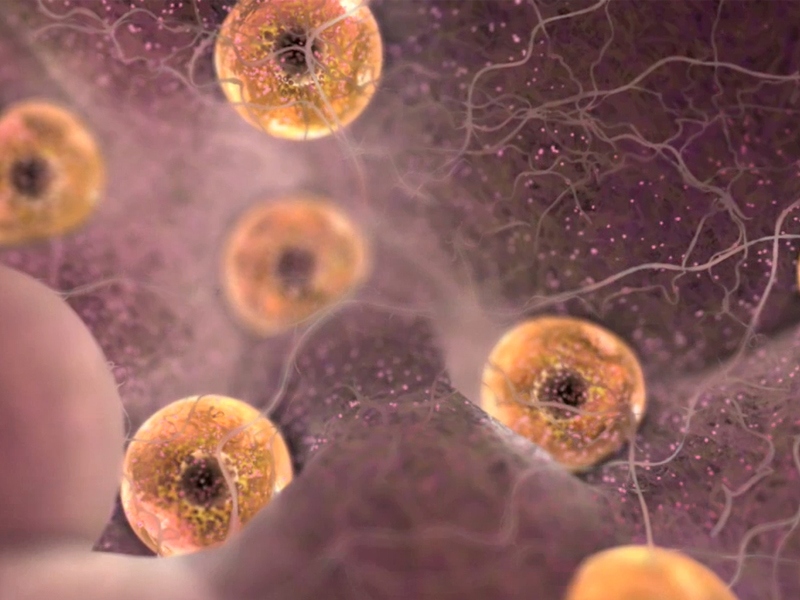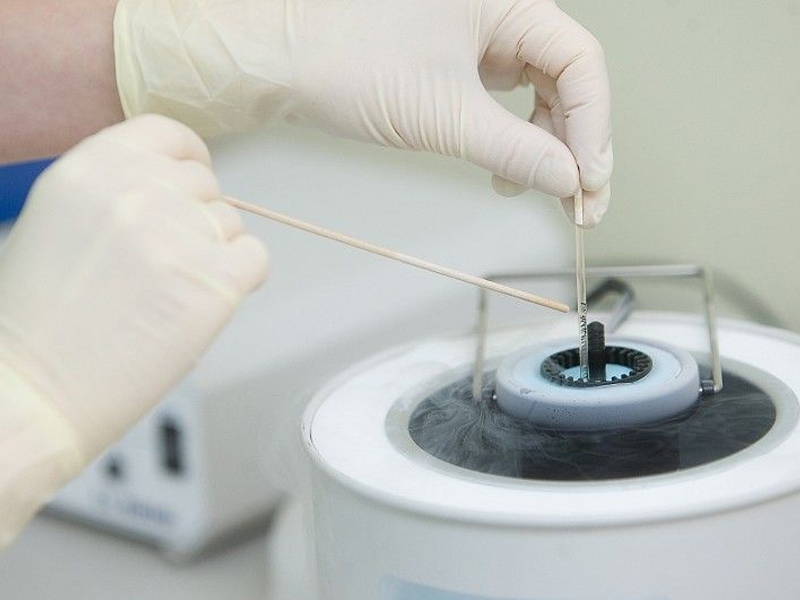Follicle-stimulating hormone ( FSH )

What is follicle-stimulating hormone?
Follicle-stimulating hormone (FSH) is a glycoprotein gonadotropic hormone that is formed in the anterior pituitary. It is considered one of the main methods in the diagnosis of diseases of the reproductive system, not only of women, but also of men. In the female body, FSH promotes the development of ovarian and follicles in the first phase of the cycle, the growth of the endometrium, the formation of estrogen and the synthesis of estradiol granulosa cells. It is responsible for the girl’s puberty, her development and growth during this period.
In male body, follicle-stimulating hormone activates an increase in testosterone synthesis, the development of the seminiferous tubules and the maturation of sperm.
Men can be tested for FSH on any convenient day. And as for women, there are separate rules for passing it. You need to come to the laboratory strictly in the morning, on the 4-6 day from the beginning of the cycle. Because normal levels of follicle-stimulating hormone change throughout the female cycle. Moreover, it is secreted in an intermediate time frame of pulses, approximately every 3 hours and depends on the indicators of other sex hormones in the blood.
You need to donate blood strictly on an empty stomach. 3 days before the diagnosis, you must give up smoking, sports training, and alcohol. Stop taking hormonal drugs.
When is the FSH test prescribed?
The analysis for FSH in the blood allows you to establish the level of imbalance in hormonal regulation. It is primary (direct damage to the most secretory glands) and secondary (violation in the hypothalamic-pituitary system).
The main indications for the appointment are the diagnosis of infertility and spermatogenesis pathologies. Also it is used to indicate the cause of early puberty or its developmental delay in children and adolescents, also during menstrual disorders (anovulation, oligomenorrhea and amenorrhea), chromosomal congenital abnormalities and to check the effectiveness of hormone therapy.
FSH level norms for men and women
The interpretation of the research indicators is carried out exclusively for a specialist and this is not considered a full-fledged diagnosis, therefore it is impossible to carry out self-treatment, it must be done only on the advice of a doctor.
FSH is considered a fickle hormone and its levels change regularly depending on age, health, and other factors.
Normally, in children, the level of follicle-stimulating hormone is increased from birth, but then it sharply decreases: about 6 months old in boys and about 1–2 years old in girls. Its repeated growth is observed already right before the puberty, as a result of which the concentration of sex hormones also increases.
For guys aged 0-18 years, the border of the norm is 0.03-3.9 mOd / ml, and over 18 years old – 0.95-11.95 mOd / ml. After the onset of puberty in men, the FSH concentration is relatively constant.
As for the female body, up to 3 years of age the level of FSH in the blood is 0.11-13 mO / ml, from 3 to 9 years old – 0.11-1.6 mO / ml.
It must be remembered that before the onset of puberty, the amount of the hormone in a woman’s body is low, and then there is a sharp increase in its level. FSH stimulates the formation of secondary sexual characteristics in girls, and also triggers the development of eggs and affects menstruation. Ovulation (the release of an egg from the follicle) contributes to a sharp increase in the concentration of FSH together with LH (luteinizing hormone).
Therefore, the amount of follicle-stimulating hormone depends on the menstrual cycle:
- Follicular phase: 3.03-8.08 mOd / ml
- Ovulatory phase: 2.55-16.69 mOd / ml
- Luteal phase: 1.38-5.47 mOd / ml
- Postmenopause: 26.72-133.41 mOd / ml
A high amount of gonadotropins, in combination with a low level of sex steroids, indicates an inferior function of the sex glands. And an increase confirms their primary pathology. Increased levels of follicle-stimulating hormone In a normal state, an increase in FSH levels occurs exclusively during menopause.
In other cases, its increase indicates such pathologies:
- primary hypogonadism, congenital or acquired testicular failure in men);
- hypergonadotropic hypogonadism (in women);
- premature ovarian failure (early onset of menopause);
- a small follicular reserve (lack of immature eggs in the ovaries);
- orchitis. The inflammatory process in the testicular tissues of the testicles is caused by a bacterial, viral nature or injury;
- insufficiency of the functions of the sex glands. Regardless of the cause.;
- gonadal dysgenesis. This is an abnormal congenital disorder of the development of the reproductive system in men and women;
- klinefelter’s syndrome. A genetic disease that occurs in males due to the presence of an additional sex X chromosome in their DNA;
- gonadotropin-secreting pituitary tumors;
- damage to the testicular tissue in alcoholism;
- dysfunctional uterine bleeding;
- intoxication of the body;
- resistance to gonadotropin;
- influence of X-rays;
- uncontrolled medication intake: liberins, ketoconazole, levodopa, clonidine, nafarelin, naloxone, phenytoin, pravastatin, cimetidine and others.
It is also possible to increase FSH against the background of emotional changes or if the woman has experienced severe stress.
Most of these diseases are accompanied by the presence of infertility, therefore, FSH analysis is considered one of the first to diagnose and determine the cause.
Low FSH levels
Low FSH levels confirm dysfunction of the hypothalamus or the pituitary gland. The FSH analysis itself suggests that the level of the hormone in the blood is lowered.
This is typical for:
- hyperprolactinemia. An increase in the hormone prolactin in the blood
- secondary hypothalamic amenorrhea
- a sharp loss of body weight
- prolonged fasting; – pituitary dwarfism. Termination of the production of growth hormone
- somatotropin
- hypogonadotropic hypogonadism
- obesity
- polycystic ovary syndrome. It is characterized by a change in the structure of the ovaries and their dysfunction
- sheehan’s syndrome. Postpartum necrosis of the pituitary gland
- kallman syndrome. A genetic disorder that causes delayed puberty and damage to the sense of smell
- hypofunction of the pituitary gland and hypothalamus
- uncontrolled intake of anabolic steroids, carbamazepine, danazol, corticosteroids, estrogens, combined oral contraceptives (COCs) and others
Follicle-stimulating hormone in postmenopausal women
With age, the function of the ovaries fades away, the hormone amount in the blood becomes less and less, the reproductive function of a woman is turned off and menopause occurs. During this period, the concentration of FSH, as well as luteinizing hormone, increases. And normally it is 25.8-134.8 mOd / ml.
This is due to the fact that changes occur in a woman’s body, and the level of FSH rises in response to a decrease in estradiol (the main sex hormone of a woman). But its level still needs to be constantly monitored, since a doubling of the level (than the average level of FSH in a woman of reproductive age) may indicate a problem.


